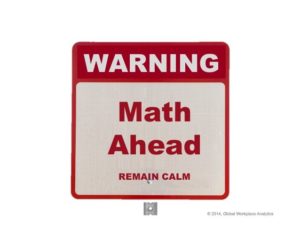We have a winner! In December, Patrick LaRoche of Ocala, Fla., discovered the largest prime number known to humanity. It’s got almost 25 million digits. Just writing it down would take you a couple of years. Provided you didn’t take a vacation.
A prime number is a number greater than 1 that is divisible only by 1 and itself. For example, 2, 3, 5, and 7 are primes. 6, 8, 9 and 10 are not. Primes have fascinated humans ever since we learned to count, because they are the fundamental building blocks of arithmetic. And yet, there is no known pattern to them.
They’re just out there, waiting to be found.
How many primes are there? Over two thousand years ago, the Greek mathematician Euclid proved they were infinite in number. That’s how long we’ve been studying these strange beasts of the counting world.
What’s particularly fun about the search for big primes is the crowd sourcing of the process. Anybody with a computer can join in. Just ask the internet about the Great Internet Mersenne Prime Search, or GIMPS. You download the code, run it, and leave it alone. A month or so later, you learn whether or not you’ve found a new record prime.
Some people search for years with no luck. Others, like LaRoche, hit the jackpot quickly.
For the past few decades, the largest known primes have been what are known as Mersenne Primes. Marin Mersenne was a Catholic priest and theologian who lived in the 17th century. He was also a gifted scientist and mathematician. The primes that bear his name are of a special form that makes them easy to test quickly, even though at this point they’re now mind-bogglingly enormous.
The new champion is the 51st Mersenne Prime. It will bear Laroche’s name for all eternity. How big is it, you ask? By my calculations, if you took all the atoms in the universe, made each one of those atoms its own universe, and made each one of those atoms universes, you’d have to repeat that process 18 times to get a count of atoms as big as this number. And yet, compared to infinity, it’s nothing.
Well, to us math geeks, this stuff is simply awesome. In the literal sense. We find awe in the infinity of numbers. If you want to encounter the infinite, don’t bother meditating, don’t bother looking out into space. We’re still not sure if the universe is infinite or not, but the number of stars in the part of the universe we’ll ever be able to see is finite.
Infinity isn’t a number, it’s an idea, one that we encounter in mathematics all the time. You never know what useful things will pop out of seemingly theoretical speculations on the nature of infinity until years later. It turns out there are fundamentally different kinds of infinity, an insight that led its discoverer to commit himself to a sanitorium. But ultimately these kind of insights can have great practical value, if we’re willing to wait a century or two.
Ideas on the nature of infinity and the limits of logic, for example, led the British mathematician Alan Turing to develop the foundations of computers in the 1930s. Discoveries about prime numbers over 250 years ago are what make e-commerce possible today.
In a year or so someone will find Mersenne Prime #52, and we’ll have a new champion. The search will go on as long as humanity contains curious minds. That is how it should be. The difference now is that you don’t have to be a mathematical genius to find it. You just need a computer and an internet connection. How awesome is that?
Barry Fagin is Senior Fellow in Technology Policy at the Independence Institute, free maret think tank in Denver, and a Professor of Computer Science. He is the co-inventor of the Crandall-Fagin algorithm, used in the GIMPS project to discover all record primes for the last twenty years.


